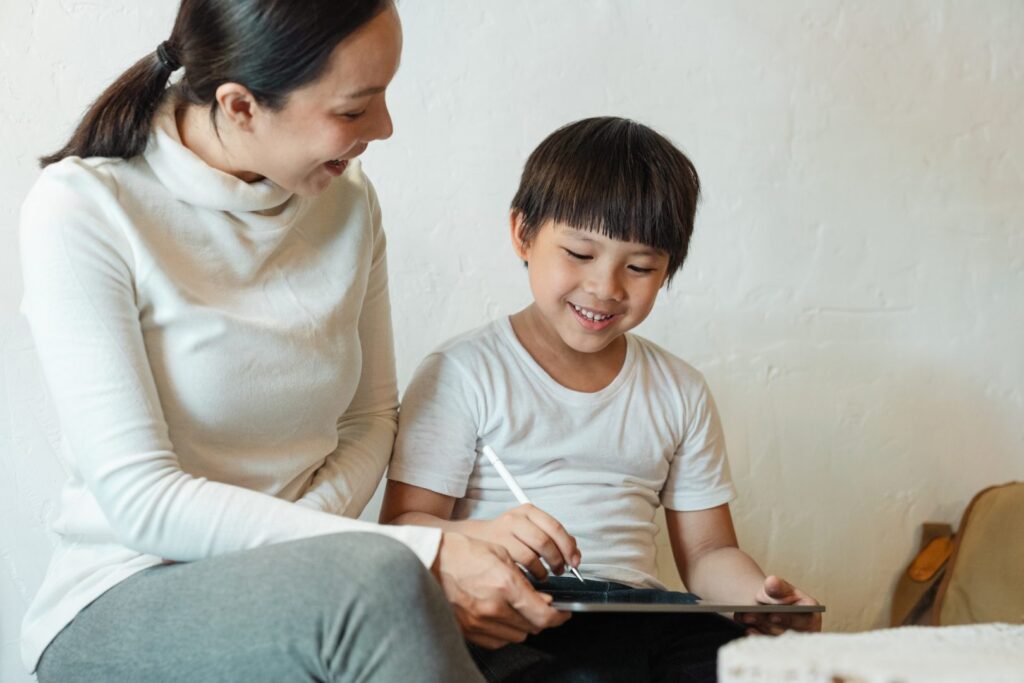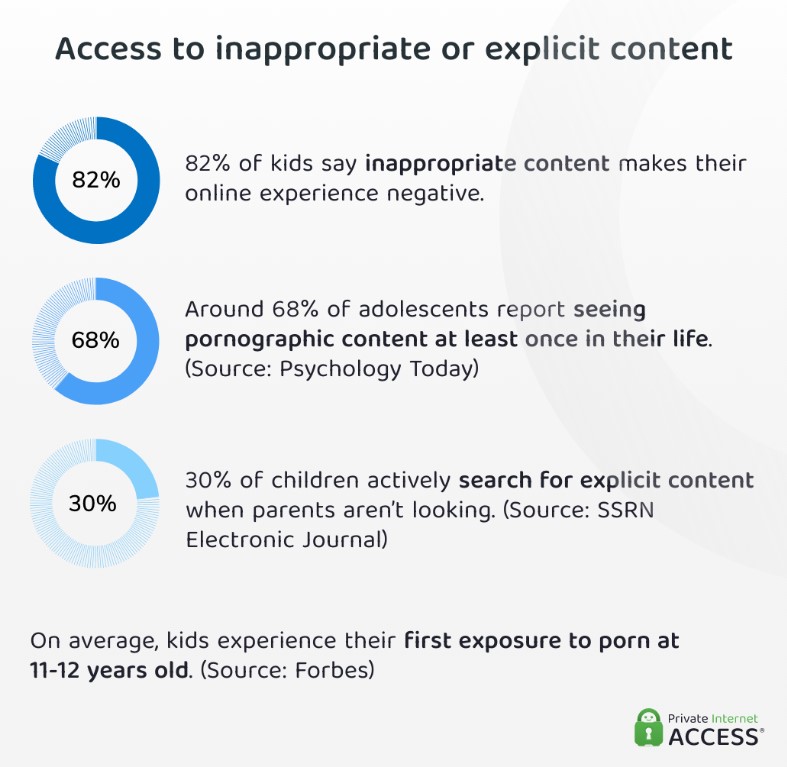It is rare to find simple and honest people nowadays. Experience has shown that we can’t trust our closest friends, and how can we trust strangers?
Analyzing the offline and online worlds, we can find a connection between them and conclude that we need protection for ourselves and our kids.
The Importance of Protecting Our Kids Online

The digital world demands digital skills and awareness of existing dangers. We want our kids to grow into physically and mentally healthy people, so we should invest in their protection.
Kids can often run into inappropriate content, comments, or behavior on the Internet. These threats can affect our kids negatively.
Usually, we parents ignore the first signs we see in our kids’ behavior, but we shouldn’t. If you let tech educate children, you’ll see your children changing their personalities in front of you.
Kids can manifest the same acts as the content they have witnessed. Exposure to non-quality content on the Internet can make kids develop:
- Harmful feelings about themselves;
- Eating disorders;
- Violent, aggressive, and abusive actions;
- Hate speech;
- Discrimination and racist behavior;
- Inappropriate vocabulary;
- Too high or low self-esteem;
- Confusion and distraction;
Prevalence of Inappropriate Content on the Internet
Kids face inappropriate content online every day (every hour and minute). The spread of abnormal content on the internet is enormous. Studies have shown that:
- About 56% of the children between the ages of 10 and 16 have witnessed inappropriate explicit content, videos, and pictures;
- 40% of children between the ages of 11 and 17 have seen violent, racist, and discriminatory content;
- 20% of children between the ages of 8 and 11 have seen content that causes fear, disgust, and shame.
How to Prevent Kids from Seeing Inappropriate Content Online

Parents must protect their kids from inappropriate and abnormal behavior. The best way to prevent exposure to bad content online is to pay attention to the different types of inappropriate content and their effects on children.
We’ll quickly discuss which content you should consider harmful.
Violence and Aggression
Kids that see this content can develop aggressive attitudes toward family and friends and imitate what they’ve seen. On the other hand, kids can feel fear that something is going to happen to them.
Studies and real-life experiences have shown that the link between online content and aggression is real and dangerous.
Discrimination and Harmful Content
This type of content stimulates kids to be mean to others and themselves. Studies show that about 14% of children act mean on the Internet.
Moreover, viewing discriminatory content can make children feel bad about who they are (skin color, religion, nationality). And some reports show that approximately half of all children have been bullied online.
Gambling and Addiction
Kids are curious and want to practice what is seen online, even when the content is harmful. Studies show that some video game systems are closely linked with gambling and encourage this behavior in children.
Pornographic Content
By watching explicit content, youngsters can get confused, ashamed, and get the wrong picture about the relationships between adults.
Statistics show that 63% of girls and 93% of boys have seen this type of content online.
How Can Children be Exposed to Inappropriate Content
The Internet is a common place for our kids but also for users with abnormal behavior. They can meet on social media platforms and when they play video games.
Social Media
Kids create profiles on social media to communicate with others. These platforms are really popular between kids and dangerous at the same time.
If kids use public profiles and don’t respect their privacy and safety, they can witness inappropriate behavior.
Video Games
Kids love to play video games and connect with other kids. But what happens if players are not kids or are children with harmful manners?
Our children like online chatting when it comes to interacting with their peers. However, they can also be victims of cyberbullies and online predators.
Research has shown that about 35% of children are exposed to harmful and violent content while playing video games.
Protect Your Kids
Parents need to monitor and control their kids’ activities on social media. Talk to your kids about the proper usage of these platforms and put parental control apps on their tech devices.
Parents can choose from various parental control apps and download them to tech devices by focusing on these features of the app:
- Limit screen time;
- Recognize, report, and block inappropriate content;
- Track and locate your kid;
- Protect private and safety information;
- Detect cyberbullies and online predators;
How Parents Can Monitor Their Kids’ Activity Online

Conversations between parents and their kids can build a trustful and healthy relationship. Use the following tips to monitor your kid’s activities effectively:
- Learn and use the same apps your kid uses and monitor the contents and possible dangers that can appear;
- Get informed about apps your children use;
- Teach your kids how to stay safe online, keep their private information and passwords to themselves, and don’t use public profiles on social media;
- Limiting screen time as a family rule and convince your kid to let his smartphone rest when going to bed;
Setting Parental Control Apps
Parental control apps are reliable programs for parents that want to keep an eye on what their children do on their devices. They offer countless opportunities such as:
- Limiting screen time;
- Blocking sites and apps;
- Tracking location;
- Monitoring searches;
- Monitoring messages;
Some of the best parental control apps are FamiSafe, iKeyMonitor, Google Family Link, mSpy, Panda Dome Family, etc.
Conclusion
When we monitor our kids’ growth, we analyze should their physical and mental changes.
But when we witness our kids change their behavior, we can suspect that they’ve been exposed to inappropriate content.
Don’t let your kid become a victim of internet abnormalities. Do the research and be informed.
FAQ
What do I do if my child sees something inappropriate online?
Stay calm and find a solution. If it’s an app, delete it and restrict it with parental control apps. If it’s a web page report it and block it.
How do I talk to my child about inappropriate Internet searches?
Approach your kid with a calm and understanding voice. Don’t break your trust. Openly talk about the risks of children exposing themselves to this type of content.
How do I get my child to stop watching inappropriate videos?
Instal parental control apps and monitoring software that can filter inappropriate content. Also, having an honest conversation with your child about the adverse effects of such content is a good idea.
How do I filter inappropriate content?
You can always use parental control apps! Some are free, like Google Family Link, and others are paid but have more features ( for example, mSpy).
ALSO READ: How to Prevent Gaming Addiction in Children







